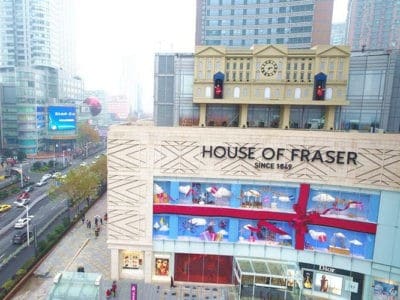
Yuan Yafei’s Sanpower may be giving up control of House of Fraser
China’s Sanpower Group is poised to sell a majority stake in troubled UK retailer House of Fraser, less than four years after the Nanjing-based conglomerate bought an 89 percent interest in the department store chain.
Sanpower subsidiary Nanjing Cenbest (Nanjing Xinjiekou Department Store) announced in a filing to the Shanghai stock exchange that it was in advanced talks with Wuji Wenhua, a developer and operator of tourist resorts, to sell a 51 percent stake in the London-based retailer.
Sanpower acquired House of Fraser in April 2014 for £155 million ($259 million). At the time, Sanpower chairman Yuan Yafei trumpeted his ambition to globalise the retailer by rolling out new stores in Russia and the Middle East, as well as up to 50 new stores in China under the moniker “Oriental Fraser.” Since then, House of Fraser has opened only two stores in mainland China.
House of Fraser Stalls in China
“Sanpower continues to support House of Fraser and I believe that House of Fraser is going to have a bright future,” Mark Logan, Overseas Spokesman for the Nanjing firm commented to Mingtiandi. “Sanpower recognises all the hard work people in the UK and China are doing to transform the brand.”
The private conglomerate owns 27 percent of Nanjing Cenbest, making it the largest shareholder in one of China’s top ten department store chains. Nanjing Xinjiekou Department Store has outlets in eastern China’s Jiangsu and Zhejiang provinces.

House of Fraser opened its Nanjing flagship at the end of 2016
House of Fraser debuted in China in December 2016, with the opening of a 425,000 square metre flagship store in Nanjing, capital of Jiangsu province — nearly a year behind schedule. A second outlet followed in the city of Xuzhou, in northern Jiangsu.
The 169-year-old brand with roots in Glasgow, Scotland has 59 stores in the UK and Ireland and one in Dubai.
House of Fraser posted a 2.9 percent sales decline over the holiday shopping season and is in talks with landlords to reduce rents on some of its UK stores, according to Bloomberg. The company reported net income of $37.1 million in the year through January 2017.
Sanpower Finds Buyer From Own Neighborhood
“Although Nanjing Cenbest and Wuji Wenhua are still in discussions, we believe that Wuji Wenhua can be a strong strategic equity partner as they possess vast experience in the leisure sector and have access to a large network of travelers,” Nanjing Cenbest said in a separate statement.
“This additional partnership will help House of Fraser to further internationalise its brand to reach out to an increasingly large international consumer base,” the company added, saying it was “very proud” of its continued stake in the brand.
Wuji Wenhua (or Wuji Culture), also based in Nanjing, is jointly owned by Nanjing Fullshare Industrial Holding Group, Jiangsu Eastide Group, and Respublic Group. Fullshare, which owns a 45 percent stake in the firm, has interests ranging from health care to construction engineering and commercial property development.
Sanpower, which also owns US lifestyle products brand Brookstone and Israeli home healthcare provider Natali Seculife Holding, has total assets exceeding RMB 120 billion ($19 billion) according to its corporate website.
Department Store Death March Continues
The department store format has struggled for years in the face of rising competition from e-commerce and speciality boutiques. Malaysia-based Parkson, which opened its first mainland department store in 1994, has been closing locations across China in recent years in the face of steadily declining sales.
British department store Marks & Spencer pulled out of the mainland last year as part of a plan to close more than 80 stores globally. After shuttering its 10 mainland stores, the company announced this past January it had sold its retail business in Hong Kong and Macau to its franchise partner.
Greater China is not the only market where department stores are facing headwinds. UK retailer Debenhams is in talks to rent space in its flagship London department store to shared office brand WeWork, according to a report this week.
The 240-store chain announced last year it was closing and downsizing some outlets, and seeking partnerships with other firms to make use of surplus space.
Leave a Reply